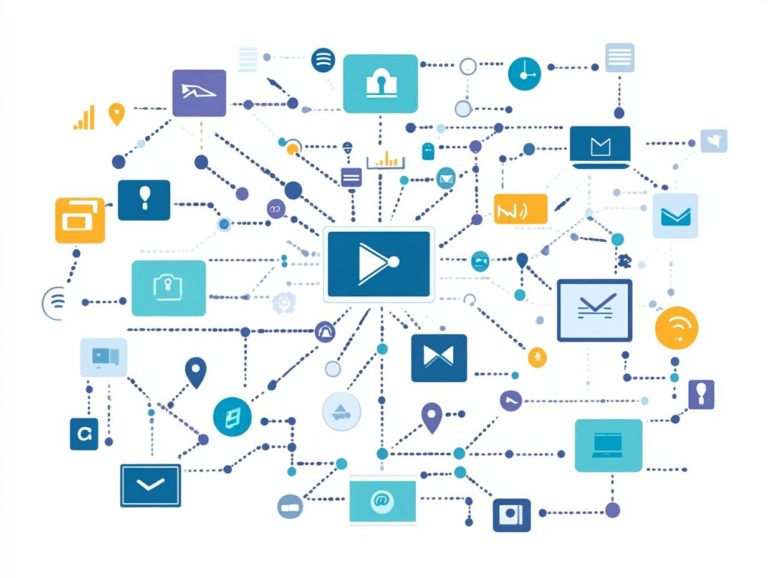How to Use CRM Software for Marketing?
In today s competitive landscape, managing customer relationships effectively is essential for any successful marketing strategy.
CRM software presents a powerful solution that streamlines processes, enhances customer interactions, and ultimately drives growth.
This article delves into the myriad benefits of CRM software, from refining your marketing efforts through lead management and dividing customers into specific groups to outlining best practices for implementation.
Explore how to leverage CRM tools to optimize your marketing strategies and cultivate enduring customer connections.
Contents
- Key Takeaways:
- Benefits of Using CRM Software for Marketing
- Key Features and Functionality of CRM Software
- Implementing CRM Software into Your Marketing Strategy
- Best Practices for Using CRM Software in Marketing
- Frequently Asked Questions
- What is CRM software and why is it important for marketing?
- How do I get started with using CRM software for marketing?
- What are some key features to look for in CRM software for marketing?
- How can CRM software help with lead generation?
- Can CRM software be integrated with other marketing tools?
- How can I measure the success of my marketing efforts using CRM software?
Key Takeaways:

- Streamline marketing processes with CRM software to save time and increase efficiency.
- Improve customer relationships using lead management and customer segmentation features.
- Successful integration of CRM requires proper planning and execution.
What is CRM Software?
CRM software, or Customer Relationship Management software, is an invaluable asset for managing customer interactions throughout their journey. By consolidating all customer data into a single platform, CRM software gives you the power to enhance lead management, create targeted marketing strategies based on customer data, and elevate customer experiences and engagement.
As a cornerstone of marketing automation, CRM solutions allow you to streamline your sales processes, monitor customer behavior, and optimize your marketing efforts. Additionally, using CRM software for surveys can enhance customer insights. This software integrates effortlessly with various marketing channels, including email marketing platforms and social media networks, ensuring cohesive campaigns across different touchpoints.
By automatically syncing data, CRM systems enable you to analyze customer engagement in real time, leading to more informed decisions. This integration fosters stronger customer interactions by facilitating personalized communication tailored to user behavior and preferences.
It also measures how effective your marketing campaigns are through detailed analytics, ultimately resulting in improved ROI and a deeper understanding of customer needs.
Benefits of Using CRM Software for Marketing
Utilizing CRM software for marketing purposes streamlines a variety of processes, elevating the overall customer journey while giving you the power to manage your marketing strategies with precision. To learn more about this, check out our guide on how to use CRM for email marketing.
By leveraging customer data, you can craft personalized messaging and targeted content that resonates deeply with your audience, enhancing customer engagement and ultimately driving conversions.
This data-driven approach not only facilitates better lead nurturing but also optimizes your campaigns, ensuring that your marketing efforts align perfectly with customer needs.
Streamlining Marketing Processes
Streamlining your marketing processes with CRM software can significantly elevate your efficiency. It gives you the power to automate routine tasks, allowing you to focus on crafting impactful marketing campaigns.
With robust marketing automation features, you can manage email campaigns, digital ads, and lead management more effectively, resulting in a smoother sales funnel and improved interactions with your customers.
This level of automation not only saves you precious time but also provides better insights into customer engagement and behavior, enabling you to make informed adjustments to your strategies.
For example, with capabilities for dividing customers into specific groups, you can target demographic groups with tailored messages, maximizing relevance and boosting your conversion rates.
By diving into data trends, you can pinpoint high-value prospects and nurture leads with personalized content. Plus, CRM systems seamlessly connect with social media platforms, allowing you to coordinate promotional strategies that enhance your brand’s online presence.
Ultimately, these streamlined processes not only enhance your marketing performance but also create a more personalized customer journey, fostering loyalty and satisfaction at every stage of engagement.
Improving Customer Relationships
Improving customer relationships is at the heart of effective CRM software, designed to foster deeper engagement through personalized messaging and tailored interactions.
By leveraging customer insights and feedback, you can implement referral programs and build connections with potential customers that enhance the overall customer experience.
This personalized approach not only boosts loyalty but also fuels repeat business, making customer relationship management an essential aspect of contemporary marketing strategies.
In this context, understanding customer profiles is essential, as it gives you the power to tailor your communication to address specific needs and preferences. By creating detailed profiles based on demographics, behavior, and feedback, you can craft content that truly resonates with your audience.
Actively seeking and incorporating customer feedback ensures that these profiles remain accurate and effective over time. Ongoing refinement of strategies cultivates a culture where clients feel genuinely valued, ultimately solidifying long-lasting relationships.
Key Features and Functionality of CRM Software

Key features of CRM software significantly enhance your marketing efforts by equipping you with essential tools for lead management, audience segmentation, and effective campaign oversight, including insights on how to use CRM for lead generation.
These functionalities give you the power to collect and analyze customer data, allowing for tailored marketing strategies that resonate with specific customer profiles and behaviors.
By harnessing these capabilities, you can optimize your marketing channels and engage with your audience in a more impactful way.
Lead Management
Lead management is a cornerstone of CRM software, allowing you to meticulously track and nurture leads throughout every stage of the sales funnel.
By employing effective lead nurturing strategies and behavior tracking, you can uncover valuable insights into your customers interests and preferences.
This real-time data gives you the power to fine-tune your marketing strategies, ensuring that your performance metrics shine and your lead conversion process runs like a well-oiled machine.
Building a robust lead management system enables you to identify high-potential prospects and tailor your communication efforts accordingly, crafting more personalized interactions.
Automated follow-ups and drip campaigns, which send automated messages over time, keep potential customers engaged without overwhelming them.
Understanding behavioral patterns lets you sharpen your targeting efforts not solely through direct interactions but also by analyzing website activities.
By harnessing these insights, you enhance your marketing effectiveness and cultivate deeper relationships with your clientele, driving higher conversion rates and fostering long-term loyalty.
Customer Segmentation
Customer segmentation stands as a formidable feature of CRM software, giving you the power to categorize your audience based on specific criteria, thereby amplifying the effectiveness of your marketing campaigns.
By harnessing segmentation tools and diving deep into customer insights, you can craft personalized content that resonates with various segments of your audience, enhancing engagement and boosting conversion rates.
This targeted strategy ensures that your marketing messages hit home with customers at different stages of their buyer s journey.
Using techniques like demographic, behavioral, and psychographic segmentation, you gain a clearer understanding of your customers’ preferences and purchasing behaviors. CRM software streamlines this process by aggregating data from multiple sources, allowing for comprehensive analysis.
As a result, you can tailor your campaigns to specific customer profiles be they new subscribers, loyal frequent buyers, or those in need of re-engagement.
The advantages of this tailored approach go beyond mere personalization; they foster increased customer loyalty, higher retention rates, and ultimately, improved revenue streams.
By consistently delivering relevant content, you position your organization as a trusted partner in your customers’ journeys.
Implementing CRM Software into Your Marketing Strategy
Implementing CRM (Customer Relationship Management) software is crucial for enhancing customer engagement and optimizing marketing efforts, especially when you learn how to use CRM for market research.
This powerful tool helps you streamline data collection, automate everyday tasks, and gain insights that guide your strategic decisions.
This method empowers you to create data-driven marketing strategies aligned with customer needs.
Steps for Successful Integration
For successful CRM integration, follow these key steps to ensure a smooth transition and maximize effectiveness.
- First, assess your current marketing strategies and set clear goals for CRM implementation. Identify how to leverage data-driven marketing and automation.
- Select the right CRM platform that complements your goals and has the features you need.
- Conduct tailored training sessions for your team to familiarize them with the CRM features; this is essential for user adoption.
- Implement regular feedback loops. Gathering user input allows for necessary adjustments and enhances satisfaction.
- Prioritize continuous monitoring and evaluation to measure the CRM s impact on your marketing performance.
Best Practices for Using CRM Software in Marketing

Utilizing best practices in CRM software is essential for maximizing your marketing impact.
By optimizing data management and harnessing email marketing, you can enhance customer engagement and resonate with preferences.
A proactive approach to campaign optimization empowers you to adapt strategies based on real-time insights.
Optimizing Data Management
Optimizing data management in your CRM is crucial for maintaining accurate and accessible customer data.
Implement robust data collection techniques and use advanced analytics tools to extract valuable customer insights.
Regular data cleansing is vital to eliminate inaccuracies that could hinder analysis. Routine audits help identify discrepancies.
By using sophisticated analytics tools, you can understand complex customer behaviors and trends.
These strategies improve data quality and allow you to tailor initiatives, increasing customer satisfaction and loyalty.
Personalizing Marketing Efforts
Personalizing your marketing efforts through CRM software allows you to connect with your audience on a deeper level.
This fosters stronger relationships and drives engagement.
By using customer information for tailored messaging and crafting targeted content, you can address the unique needs and preferences of your customers.
For example, imagine a clothing retailer sending you personalized recommendations based on your past purchases, enhancing your shopping experience. Personalized email campaigns that celebrate your birthday or special milestones can significantly boost open rates and conversions.
With CRM systems, you have the power to effectively segment your audience. This ensures that specific offers and promotions reach the right individuals at just the right time.
By analyzing interaction history, you can create dynamic content that adapts to customer behavior, leading to more meaningful engagement and improved customer loyalty.
Frequently Asked Questions
What is CRM software and why is it important for marketing?
CRM (Customer Relationship Management) software is a tool that helps businesses manage and analyze customer interactions and data. It is important for marketing because it allows businesses to understand their customers better, personalize marketing efforts, and improve customer satisfaction and retention. Learning how to use CRM for lead generation can further enhance these efforts.
How do I get started with using CRM software for marketing?

First, you need to choose the right CRM software for your business needs. Then, you should set up and customize your CRM system to fit your marketing goals by following best practices for using CRM software.
Finally, train your team on how to use the software effectively.
What are some key features to look for in CRM software for marketing?
Some key features to look for include lead management, email marketing, social media integration, analytics and reporting, and workflow automation. These features can help businesses streamline their marketing efforts and improve communication with customers.
How can CRM software help with lead generation?
CRM software helps with lead generation by tracking and organizing leads, automating lead nurturing processes, and providing insights on lead behavior and interests. This helps businesses find and connect with potential customers!
Can CRM software be integrated with other marketing tools?
Yes, many CRM software offer integration with other marketing tools such as email marketing platforms, social media management tools, and marketing automation software. Understanding how to use CRM for business development allows businesses to have a more comprehensive and streamlined marketing system.
How can I measure the success of my marketing efforts using CRM software?
CRM software can provide various metrics and reports to measure the success of marketing efforts, such as lead conversion rates, customer lifetime value, and return on investment. This data helps businesses make data-driven decisions and improve their marketing strategies.
Ready to enhance your marketing efforts with CRM? Explore your options today!






